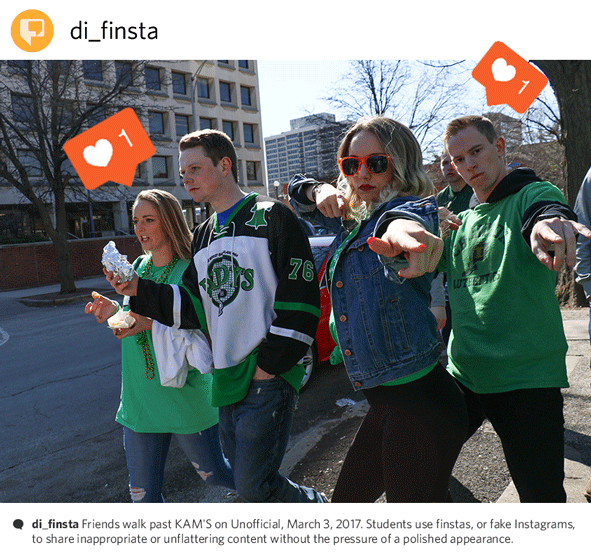Focus on the memories and not the social media “likes”
April 5, 2017
 We’ve all heard the phrase: “If a tree falls in a forest and no one is around to hear it, does it make a sound?” But for many college students, a much more relevant philosophical scenario exists: If you go out for the night but don’t take a picture to post on Instagram, did you still go out?
We’ve all heard the phrase: “If a tree falls in a forest and no one is around to hear it, does it make a sound?” But for many college students, a much more relevant philosophical scenario exists: If you go out for the night but don’t take a picture to post on Instagram, did you still go out?
While almost all social media platforms today foster an environment in which the creativity and originality of its users are rewarded, no form of social media puts more pressure on its users to create polished content than Instagram.
In order to escape the pressure of the perfect picture, kids these days have started creating a second Finsta, or fake Instagram account, in order to share more personal or unflattering photos with only close friends.
The pressure to get a lot of likes or positive comments on an Instagram pictures can be intense. Whether or not we like to admit it, receiving feedback from others in real time is often a major confidence boost.
Some in the media have hailed the emergence of Finsta as the “Instagram Revolution,” because it counters the obsession with perfection and provides an outlet for users to express their true selves, flaws and all.
Get The Daily Illini in your inbox!
While that argument might be true to an extent, creating a separate, private account misses the point of portraying yourself honestly in the first place.
A Finsta account reinforces the idea that social media cannot be a place for untailored or unpolished content. Furthermore, it creates an impossible standard that can have a real and lasting impact on the women and girls who use social media.
According to a January 2017 study conducted by Dove for their Real Beauty Sketches campaign, “over half (54 percent ) of women globally agree that when it comes to how they look, they are their own worst beauty critic, which equates to a staggering 672 million women around the world.”
Add the power of editing and Photoshop to the mix, and women and girls who are already self-conscious about their bodies are being exposed to images of their peers that are often heavily altered.
For its part, Instagram has built in features that allow users to alter everything about their appearance, from removing acne to lightening or darkening their skin tone.
It’s crucial for women to feel like they have ownership over their body, and if that includes touching up an image in order to feel more self-confident, then that’s great.
The danger exists, however, when women are changing their physical appearance to please or feel accepted by others, or spend hours agonizing over which photo will get them the most likes.
The result has everyone from supermodel Kendall Jenner to regular women cracking under the pressure of keeping up appearances. Taking a break from social media in an effort to recharge one’s mental state is becoming increasingly common.
In the spirit of full disclosure, I myself follow several of my friend’s Finsta accounts. Most of them are wild, crazy and a lot more interesting than their official Instagram accounts.
More importantly, though, all of them are more authentic than the image they are portraying to the general public. We have a male-driven society to thank for pitting women against each other and suggesting that only one type of beauty is acceptable.
So take it from a graduating senior: The next time you go out with your friends, focus on the memories and not the likes. It’ll all be over before you know it.
Jessie is a senior in Media.







